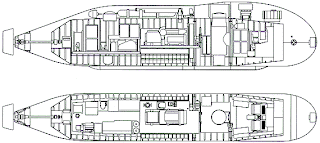The Sea Dagger series of submarines are special operations vehicles developed by Kockums of Malmo, Sweden, now owned by HDW of Germany. The small stealthy submarines are tailored for five types of missions: attack; autonomous swimmer delivery; surveillance and minehunting; and as a target vehicle for antisubmarine warfare exercises and training.
The Sea Dagger variants are constructed from three modules, the bow and stern modules and one chosen from four specific mission module options. The submarines are small, with displacement in the range of 55t to 72t, a length of between 16 and 20m, a height of 3.6m and a diameter of 2.5m.
The four variants of Sea Dagger are equipped with sonar, communications systems, and a comprehensive navigation suite including a navigation computer, a gyroscope compass, speed log, depth gauge, echo sounder, global positioning system, navigation radar and optronic mast.
The concept consists of six modules: one and two the bow and stern, with the remaining four specific mission modules.
PROPULSION
The diesel electric engine provides a surface speed of 6 or 7 knots according to the submarine configuration, and a submerged speed of 8 knots. The operational endurance is eight days (five days for the Advanced Target Submarine). The range is 2 x 350 nautical miles at 4 knots (3 knots for the ATS), and 70 nautical miles under battery power at 4 knots (35 nm at 3 knots for the ATS). The surface speed is 7 knots and the underwater speed 8 knots. The operational endurance is eight days (five days for the ATS).
SEA DAGGER SMALL ATTACK SUBMARINE
The Small Attack Submarine has the capability to carry and launch externally stowed weapons. A range of half-length anti-submarine warfare (ASW) weapons and mines can be carried. The submarine is operated by a crew of four, with two combat system operators. The rescue chamber can accommodate single escape or lockout.
Schematic of Small Attack Submarine (SAS).
The attack submarine is fitted with passive, intercept and obstacle avoidance sonar. The communications systems include VLF/LF, HF, and VHF antennae, internal and external communications, an underwater telephone system and a diver communications system.
The submarine's combat systems include a command and control system, electronic support measures, two external torpedo tubes and a weapons launching system.
SEA DAGGER AUTONOMOUS SWIMMER DELIVERY VEHICLE (ASDV)
The ASDV Autonomous Swimmer Delivery Vehicle carries, delivers and retrieves combat swimmers. The operational endurance is eight days. The vehicle carries no external weapons.
The submarine is operated by a crew of four and can accommodate up to six divers. A lockout chamber allows four divers to exit simultaneously.
The ASDV has passive, intercept and obstacle avoidance sonar. The communications suite includes a VLF/LF antenna system, HF and VHF antennae, external and internal communications, underwater telephone system and a diver communication system.
SEA DAGGER ADVANCED SURVEILLANCE VEHICLE (ASV)
The Advanced Surveillance Vehicle is equipped for surveillance and minehunting operations. An electronic support measures system is installed on the submarine. The communications system provides transfer of surveillance data. The submarine is operated by a crew of four, with two surveillance and minehunting system operators.
Schematic of Advanced Surveillance Vehicle (ASV).
The submarine has passive, intercept and obstacle avoidance sonar. The communications systems on the surveillance vehicle are VLF/LF, HF and VHF antennae, external and internal communications, underwater telephone and diver communications.
SEA DAGGER ADVANCED TARGET SUBMARINE (ATS)
The Advanced Target Submarine, ATS, provides a target vehicle for Anti-Submarine Warfare (ASW) training primarily for littoral warfare training. A variety of signatures and target signal strengths can be generated by the target simulator. The ATS is operated by a crew of three and the operational endurance is five days.
The Advanced Target Simulator is equipped with an obstacle avoidance radar, a VHF antenna system, external and internal communications and an underwater telephone system.
Source naval-technology.com




..gif)






